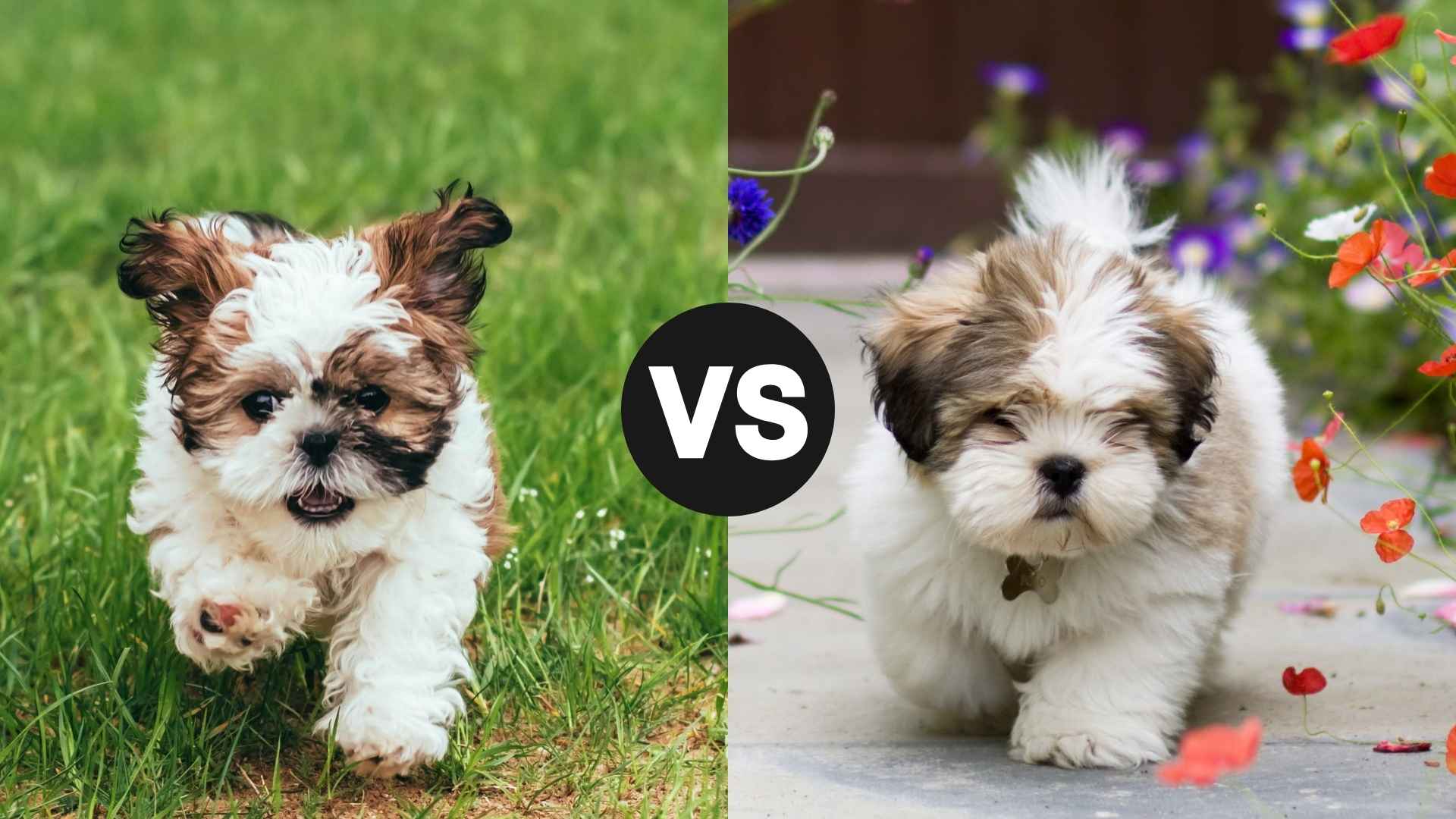Shih Tzus and Lhasa Apsos are often mistaken for one another due to their similar size and luxurious coats. However, these breeds have distinct histories, personalities, and care needs. Originating from Tibet, the Lhasa Apso was bred as a watchdog for monasteries, making it naturally alert and independent.
In contrast, the Shih Tzu, with royal Chinese lineage, is a friendly companion dog known for its affectionate nature. Understanding their key differences in temperament, grooming needs, and trainability can help determine which breed best suits your lifestyle.
Whether you’re looking for a loyal lap dog or a more independent yet protective companion, this guide will help you make an informed choice between these adorable breeds.
Shih Tzu vs. Lhasa Apso
Shih Tzus and Lhasa Apsos may look similar at first glance, but these small dogs have distinct characteristics that set them apart. Recognized by the AKC, both breeds resemble their Pekingese ancestors with their plumed tails and sturdy build.
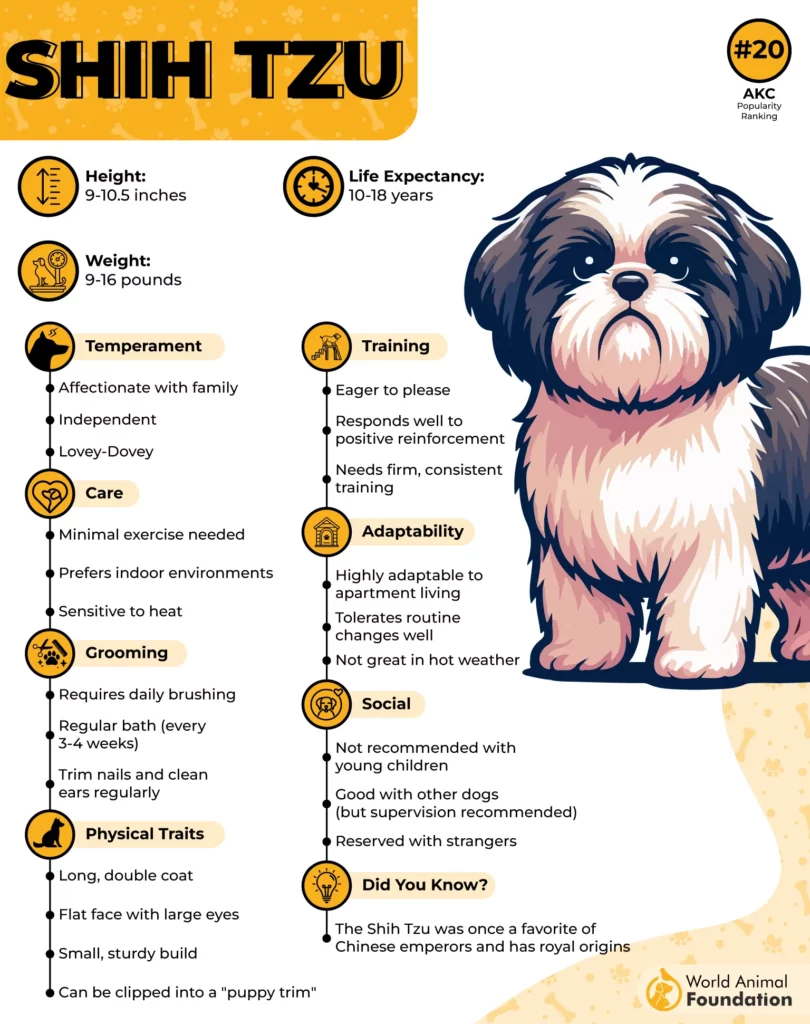
The Shih Tzu is a friendly and affectionate breed, originally bred as a companion dog for Chinese royalty. These sturdy little dogs have a flowing long coat, a cheerful disposition, and a love for human interaction, making them wonderful family pets.
On the other hand, the Lhasa Apso hails from Buddhist monasteries in Tibet, where it was bred as a watchdog. This ancient breed is known for its aloof and independent personality, often more reserved around strangers. While a family-friendly breed, they can be more stubborn and require consistent training.
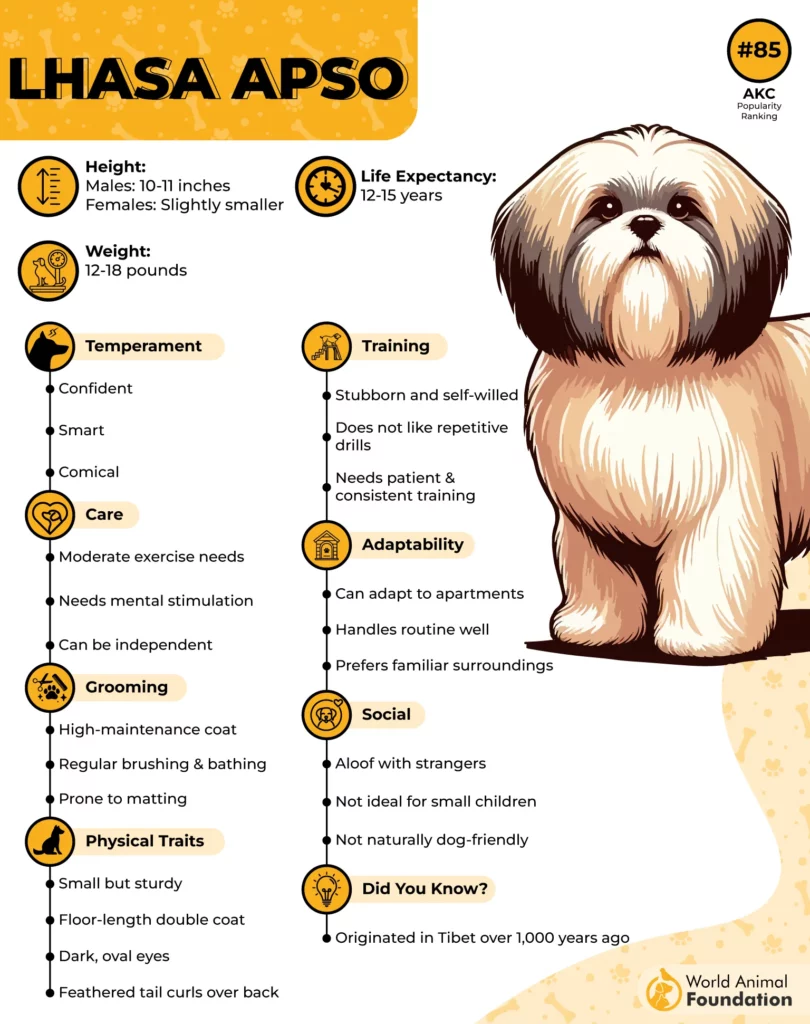
When choosing between the two dog breeds, consider your lifestyle and experience with training. If you want a cute, affectionate little dog that enjoys attention and is eager to learn new tricks, the Shih Tzu is a great choice. However, the Lhasa Apso may be better if you prefer a more independent yet loyal companion with a strong guarding instinct.
Shih Tzu vs. Lhasa Apso: Breed History
The Shih Tzu has a rich history rooted in Chinese royalty. Believed to have been bred by Tibetan monks and gifted to Chinese emperors, these dogs were cherished as palace companions. Their name, meaning “Lion Dog” in Mandarin, reflects their resemblance to the mythical Chinese lion.
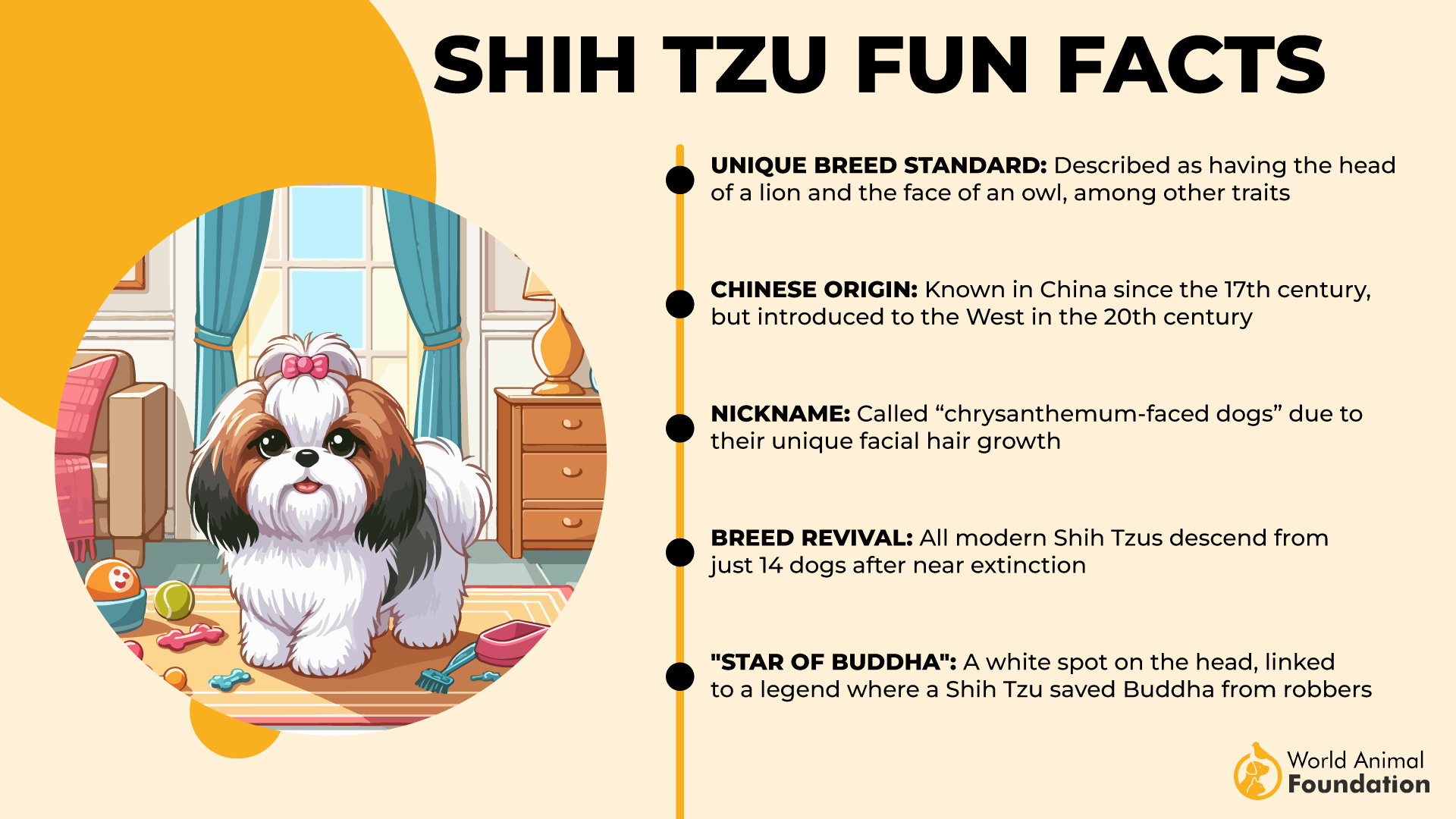
Shih Tzus were selectively bred to be affectionate lap dogs, thriving in noble households where they were pampered and adored. Their primary role was companionship, and their friendly, outgoing nature remains a key trait today.
The Lhasa Apso, on the other hand, originates from Tibet, where it was bred as a watchdog for monasteries and palaces. Lhasa Apso was valued for its alertness and protective instincts, guarding sacred places against intruders.
Their keen sense of hearing and strong-willed personalities made them excellent sentinels. While they also formed close bonds with their owners, their primary purpose was to serve as loyal guardians rather than lap dogs.
Shih Tzu vs. Lhasa Apso: Personality and Character Comparison
The Shih Tzu is known for its affectionate, friendly, and outgoing personality. Bred as a companion dog, this breed thrives on human interaction and enjoys being the center of attention. Shih Tzus are highly social, making them great for families, seniors, and first-time dog owners.
They are playful, gentle and generally get along well with children and other pets. Their loving nature makes them ideal lap dogs, but they can also be stubborn regarding training.
In contrast, the Lhasa Apso is slightly larger, more independent, and strong-willed. Originally bred as a watchdog, this breed has a natural guarding instinct and can be wary of strangers. While they form strong bonds with their family, they are not as openly affectionate as Shih Tzus.
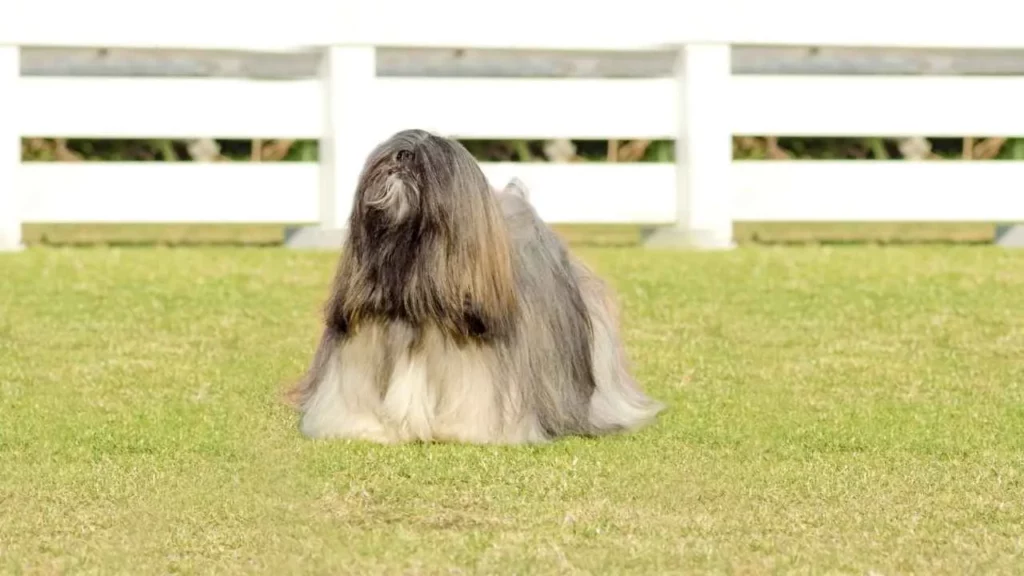
Lhasa Apsos are intelligent and confident but may require firm and consistent training. Their alert nature makes them excellent watchdogs and tend to be more reserved yet deeply loyal to their owners.
Shih Tzu vs. Lhasa Apso: Training Comparison
The Shih Tzu is intelligent but can be stubborn in terms of training. Pawlicy Advisor states that this breed is affectionate and playful. They respond best to positive reinforcement methods like treats and praise. However, their desire for attention sometimes leads to selective listening, making patience and consistency essential.
Since they were bred as companion dogs, they do not have strong guarding instincts, and their training should focus on basic obedience and socialization from an early age. Housebreaking a Shih Tzu may take time, but they can learn effectively with regular routines and encouragement.

They also tend to form strong bonds with their owners, sometimes leading to separation anxiety if left alone for long periods.
The Lhasa Apso, on the other hand, is more independent and strong-willed, which can make training a challenge. Originally bred as a watchdog, they have a natural sense of alertness and can be more territorial than Shih Tzus. They require firm, consistent training with clear boundaries to prevent stubborn or dominant behavior.
Lhasa Apsos are more reserved and may take longer to trust strangers. Early socialization is crucial to ensure they develop into well-mannered pets. While not as eager to please, they can be obedient and highly trainable with the right leadership.
Shih Tzu vs. Lhasa Apso: Health Comparison
The Shih Tzu is generally healthy but prone to certain genetic and breed-specific health issues. Due to their flat-faced (brachycephalic) structure, they often experience breathing difficulties, especially in hot or humid weather.
PetMD states that they are also prone to eye problems like cataracts, progressive retinal atrophy, and periodontal disease due to their small mouths. Additionally, Shih Tzus can develop hip dysplasia and allergies. Regular vet checkups, a balanced diet, and proper grooming help maintain their overall health.
The Lhasa Apso is a hardy breed with a longer lifespan, often up to 15 years or more. PDSA states that this breed is susceptible to certain hereditary conditions. They can develop luxating patellas, progressive retinal atrophy, Cataracts, Glaucoma, hypersensitivity to certain allergens, Intervertebral disc disease, progressive retinal atrophy, and dry eye.

Lhasa Apsos require regular exercise and proper diet management to maintain their health. Routine vet visits and early detection of potential health concerns are crucial for their well-being.
Shih Tzu vs. Lhasa Apso: Grooming Needs Comparison
The Shih Tzu has a long, flowing double coat that requires regular grooming to prevent tangles and matting. Daily brushing is recommended to keep their soft fur smooth and knot-free. Many owners opt for a shorter “puppy cut” to reduce grooming time.
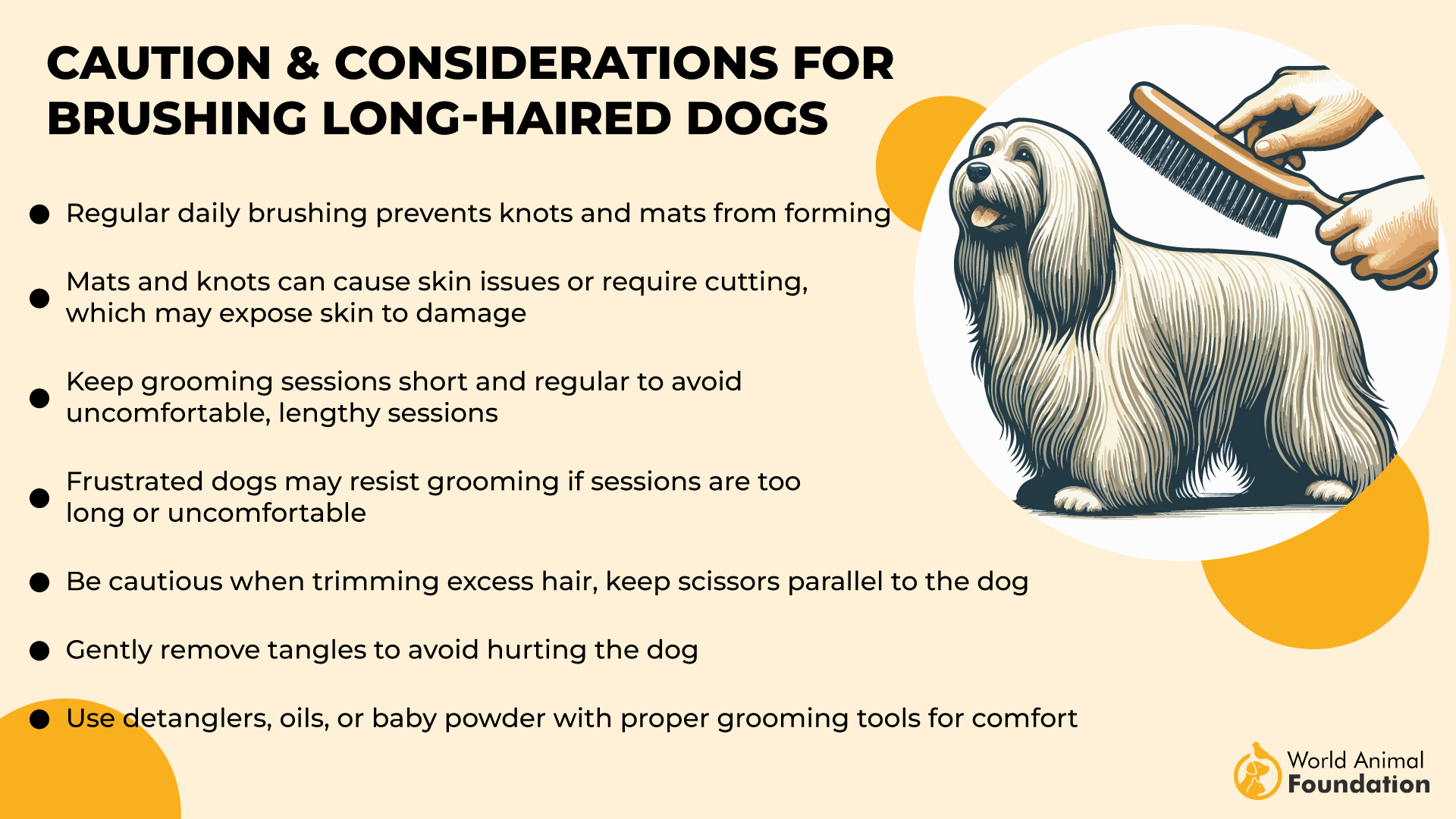
Their facial hair should be cleaned regularly to prevent tear stains and eye infections. Shih Tzus also need regular bathing, nail trimming, and ear cleaning to maintain overall hygiene.
The Lhasa Apso also has a dense, long double coat that requires consistent grooming. Their fur is prone to tangling, so daily brushing is necessary, especially if kept at full length. Some owners choose to trim their coats for easier upkeep.
Lhasa Apsos are less prone to tear stains than Shih Tzus but still require routine facial cleaning. Regular bathing, nail trimming, and ear checks are essential to keep them healthy. Both breeds require professional grooming every few weeks to maintain their fluffy coats in top condition.
Shih Tzu vs. Lhasa Apso: Lifespan Comparison
The Shih Tzu has an average lifespan of 10 to 16 years, with proper care, nutrition, and regular veterinary checkups crucial to their longevity. At the same time, they are generally a healthy breed but prone to respiratory issues due to their brachycephalic (flat-faced) structure.
They also tend to have eye and dental problems. A well-balanced diet, routine exercise, and consistent grooming can help ensure a long and healthy life.
The Lhasa Apso typically enjoys a long lifespan, averaging 12 to 17 years and sometimes even reaching 20 years with excellent care. They are known for their hardy nature but can develop hereditary conditions such as kidney disease and progressive retinal atrophy.

Regular checkups, a nutritious diet, and an active lifestyle contribute to their long life. Compared to Shih Tzus, Lhasa Apsos tend to have fewer breathing issues, possibly contributing to their slightly longer lifespan.
Conclusion
Choosing between a Shih Tzu and a Lhasa Apso depends on your lifestyle and preferences. Both breeds are affectionate companions with long, flowing coats that require the care of a professional groomer.
If you’re interested in a dog that loves companionship and enjoys light exercise, the Shih Tzu may be ideal. On the other hand, the Lhasa Apso, originally bred as a watchdog in China, carries a more independent nature.
Whether you consult a breeder or adopt, ensure your pet maintains a good weight and has no underlying health issue. Whichever you choose, these small but sturdy animals will bring joy and loyalty into your life.


